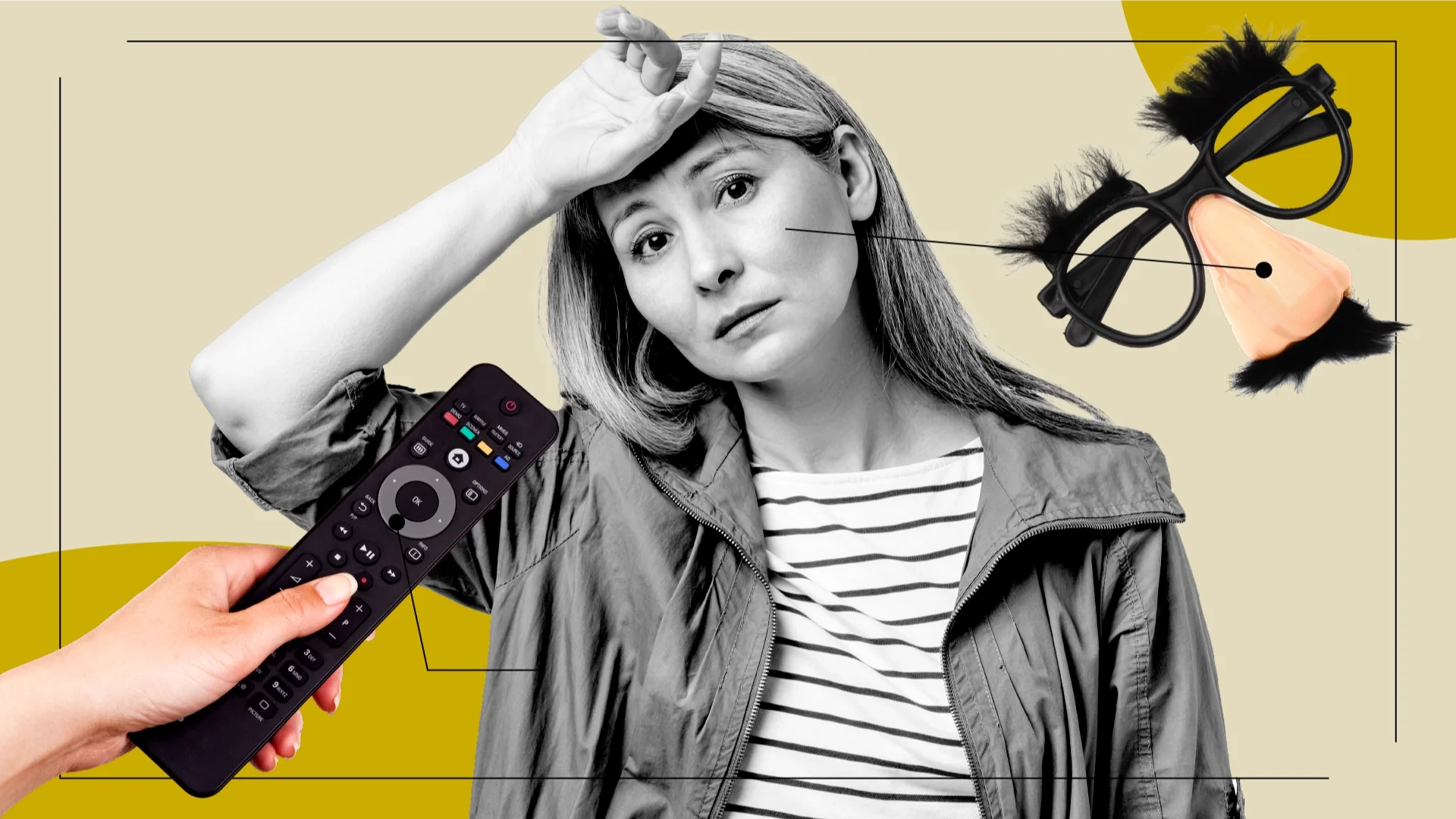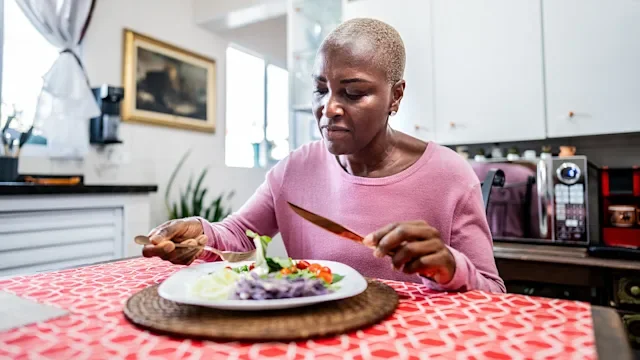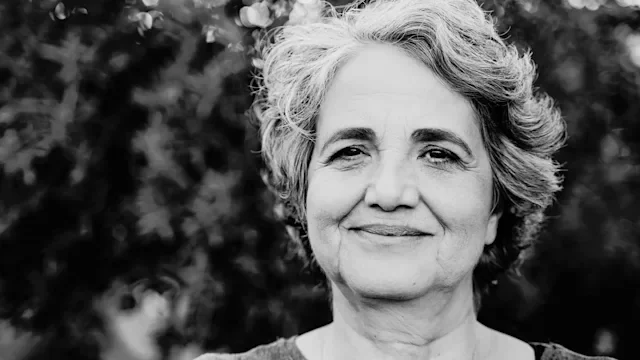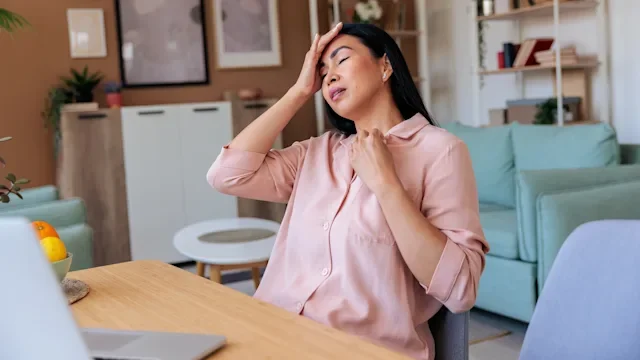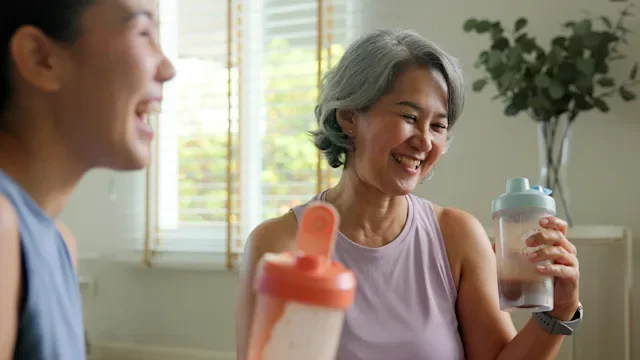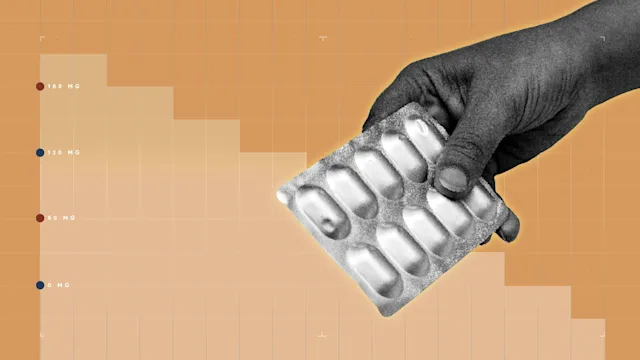Key takeaways:
Menopause is a normal part of aging, but these women are sharing their stories because they want more people to talk about the experience.
They say menopause can mean having hot flashes one minute and emotional swings the next.
These women have found that arming themselves with knowledge and humor has helped them get through the challenges of menopause.
Denise Paleothodoros entered perimenopause — the stage of life leading to her last menstrual period — in her early 40s. She was surprised it was happening so soon. Before that, most of what she knew about menopause came from TV’s “The Golden Girls,” a sitcom about retirees sharing a home in Florida.
“And I didn’t really fit the mold of ‘The Golden Girls.’ I wasn’t in my retirement years,” says Denise, now 49, who lives in the Chicago suburbs. “I was working. I was in the thick of it. I was in the grind.”
So Denise — who was working in public relations, often in the health and wellness arena — went into fact-finding mode. What was the media saying about menopause? What did research show? How were women coping?
The answers she found to those questions were “Not much.” “Research?” And “Who knows? No one talks about it.”
More than a million women go through menopause every year, yet Denise didn’t find much information about dealing with the experience. That’s why she and two others are sharing their stories here.
Finding out how menopause affects women in the workplace
Denise is now fully menopausal, but an incident that happened when she was going through the process made her think about how menopause affects women in the workforce.
Her periods had become irregular, and so she was surprised when, during a meeting at a Fortune 500 company, she began to bleed heavily, the blood soaking through her light blue pants.

Denise sent out an SOS email to some of her co-workers. A woman answered the call and came to the meeting room with a “big black sweater that was, like, from head to toe.” Denise wrapped the sweater around herself, telling others she was cold, and then considered the situation before her.
“I knew the chair was messed up, so as I left the room, I put my books and my bag on the seat,” she recalls. “I roll the chair out and pass a group of men, who are like, ‘Where are you going with that chair?’ And I said, ‘Oh, we just need a chair for a hallway meeting.’ I was completely making stuff up.”
- Vivelle-DotDotti and Estradiol
- ClimaraEstradiol
- DivigelEstradiol
Denise learned that the sweater belonged to a female executive who kept it on hand for just such emergencies. Learning that colleagues had faced similar situations got Denise thinking about working women and menopause.
The more she looked into it, the more she found examples of menopause symptoms negatively affecting women in the workforce. As Denise later wrote in an article about menopause, “Many women will be ‘paused’ on their way up the corporate ladder due to pregnancies and motherhood, and then ‘menopaused’ at the top of their climb. The most brilliant women in the world are not immune.”
One big problem is the lack of educational resources on the topic, Denise says. Before doing her own research, she says, she had mostly heard about menopause symptoms like hot flashes when people would try to make light of them. She recalls hearing jokes like, “When I said I wanted to be hotter in my 40s, this isn’t what I meant.” But Denise started finding information that was more serious, like a study about women who have hot flashes being at greater risk of heart disease than those who don’t.
Today, Denise is a menopause information advocate, writing articles, filming YouTube chats, and giving talks on the subject at different businesses.
“That’s what got me on this journey of not just being a menopausal woman but actually taking some bold actions to educate others,” Denise says. “It forced me to hit pause on my hectic life and focus on my health.”
Turning menopause into comedy
Comedian and singer Jenny Talia put her feelings about menopause to music, letting the world know exactly how she felt about the hot flashes, unwanted facial hair, and moodiness. (Spoiler alert: She didn’t enjoy them, and she has the expletive-heavy lyrics to prove it.)
Laughing about menopause made going through it easier, she says.
“I don’t care how bad something is. When you joke about it and have a release that way, even if it’s incredibly inappropriate, it feels better,” says Jenny, a native of Australia living in Chicago. “A couple people said, ‘No one wants to hear that. Men don’t want to hear that.’ Well, at my shows, it’s the most requested song by men. They’re going through it, too.”
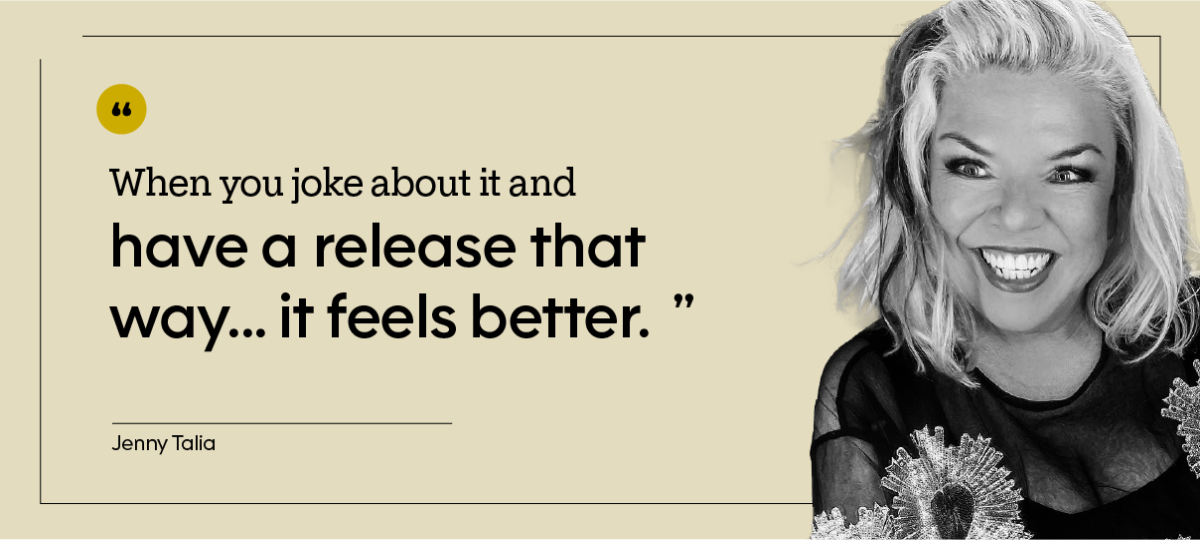
Jenny had a hysterectomy in her 40s. Immediately after the surgery, “I woke up in menopause,” she says. “People slide into it. I woke up with all (the symptoms).” Her hot flashes were so severe that she sometimes felt like she was going to throw up. Her skin, and more intimate parts of her body, became dry. She found herself growing “a spare eyebrow on my chin.” And her metabolism slllloooowwwweeeddd down.
“I look at anything with sugar now and my pants get tighter. An ounce turns into a pound on my body,” she says. “I exercise regularly, but to just maintain my weight, doctors said I have to work three times as hard.”
Jenny dealt with her brain fog by keeping lists. She found taking a calcium-magnesium supplement helped reduce night sweats and improved her sleep. She scattered fans throughout her house.
“As women, we try to squeeze it all in, but once you get those things in place, life is just easier,” she says.
She’s happy to now be “on the other side” of menopause, noting that her mother didn’t go through it until she was in her 60s. When Jenny pokes fun at menopause, she’s also bringing attention to a topic she feels has been ignored for too long.
“It’s going to come whether you want it or not,” she says. “There’s no need to suffer silently.”
Finding a menopause following on TikTok
A few years ago, Terri Mlotek noticed young women promoting beauty products on TikTok, so she decided to give it a shot. After the 58-year-old insurance executive from Chicago had posted a few product-recommendation videos, she was surprised by comments she received from women decades her junior, which could be summed up as: Why is this old lady talking about lip stuff?
Old lady? Terri didn’t — and still doesn’t — feel like that’s what she is, but she realized she probably wasn’t going to gain a Millennial following. Instead, she began experimenting with products designed for women who, like her, were seeing their skin, hair, and bodies change as they entered menopause.
“I realized no one’s really talking about this stuff to my age group,” she says. “I started digging deeper into myself and realized all the changes I was going through were a blessing and a stressor at the same time.”

Terri felt the first signs of menopause about 5 years ago. “The hot flashes and night sweats and the body aches and the mood swings,” she says. “I used to have a flat stomach, and all of a sudden I look down, and it’s like, ‘Where did that little pooch come from and why, no matter what I do, doesn’t it go away?”
Terri talks about these issues, and more, on her Tik Tok channel, which has more than 54,000 followers and is still growing. She’s honest, funny, and friendly. She talks about how hot flashes prompted her to put lock on her home thermostat; marvels at how hormone replacement therapy left her with bleeding gums, which she calls a “sick joke” if ever there was one; and muses about whether the heat radiating from the bodies of menopausal women might be the real cause of global warming.
“If I can brighten someone’s day with humor and honesty, that’s a success to me,” Terri says.
Getting older shouldn’t be scary, Terri says.
“The clarity that comes along with aging is immeasurable,” she says. “The worries that you have when you’re young are a waste of time. … What’s important is being a good person, being a good mother, sister, daughter, wife. The person you are is what’s important. Embrace the changes. Your body is an amazing thing.
“You can’t worry about what’s to come,” she says. “You just have to deal with it when you get there.”
What does the doctor say?

Patricia Pinto-Garcia, MD, MPH
Medical Editor
Menopause will change your life.
As these stories show, people might not talk about menopause often or acknowledge how much it affects day-to-day life. But that doesn’t make it any less of a life-changing experience. There’s a reason that for generations it went by the euphemism “the change.” Menopause isn’t just about menstruation. It affects your brain, bones, heart, joints, skin, and even your balance.
But studies show that many people don’t seek help for their menopause symptoms, even for distressing ones, like hot flashes.
If you’re going through menopause, it’s worth talking to your healthcare provider as soon as you start noticing changes in your period. Hormone replacement therapy can help lessen your symptoms and make the transition smoother while also providing protection against long-term medical problems like colon cancer. Hormone replacement therapy isn’t right for everyone, but it’s worth exploring how it might work for you.
Even if hormone replacement therapy isn’t an option, there are other treatments you can try and things you can do to help manage your symptoms. From exercise programs to boost bone density to complementary therapies to manage joint pain and improve balance, there’s a wide array of options available. You can also consider joining a social group, either online or in person, so you can get tips on how to navigate menopause.
Menopause affects every part of your body. Getting rid of hot flashes may be your highest priority, but once that’s under control, don’t forget to pay attention to other symptoms, too!

Why trust our experts?




